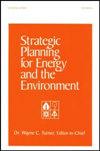Rating the Sustainable Energy Problems in Manufacturing Businesses and Selecting the Best Energy Security Policy: The Case of Samsun
Q3 Environmental Science
Strategic Planning for Energy and the Environment
Pub Date : 2023-02-15
DOI:10.13052/spee1048-4236.4025
引用次数: 0
Abstract
Today, economic development and development are extremely important. With the increasing need for energy in both the world and Turkish economy, the importance of ensuring the sustainability of the energy resources used and the security of energy supply is also increasing. Implementation of a sustainable energy system; It includes important factors such as efficient energy use together with sufficient, economical, safe and environmentally compatible energy supply. Energy is one of the main factors to consider in discussions of sustainable development. The main dimensions of sustainability in energy production are environmental protection and the economically and socially sustainable supply of energy resources in a way that is reliable, sufficient and financially accessible in the long run. For this reason, it is important for Turkey to identify sustainable energy problems and determine the right energy policy. In this study, the determination of sustainable energy problems and the problems of determining the right energy security policy in manufacturing enterprises in Samsun province in Turkey were made with multi-criteria decision making methods. As a result of this research, the most ideal energy security policy was “Resource Sharing” in the selection created by using the degrees of sustainable energy related problems in manufacturing enterprises. On the other hand, the most ideal energy security alternatives were realized as Resource Sharing (A4)>> Source Distribution (A3)>> Resource Diversification (A1)>> Price Security (A2), respectively.制造业企业可持续能源问题评价与最佳能源安全政策选择——以三星电子为例
今天,经济发展和发展是极其重要的。随着世界和土耳其经济对能源的需求日益增加,确保所使用能源资源的可持续性和能源供应安全的重要性也在增加。实施可持续能源系统;它包括诸如有效利用能源以及充足、经济、安全和环境相容的能源供应等重要因素。能源是讨论可持续发展时要考虑的主要因素之一。能源生产的可持续性的主要方面是环境保护和以可靠、充足和长期在财政上可获得的方式在经济和社会上可持续地供应能源。因此,土耳其必须确定可持续能源问题并确定正确的能源政策。本研究采用多准则决策方法对土耳其Samsun省制造企业的可持续能源问题的确定和正确的能源安全政策的确定问题进行了研究。研究结果表明,在利用制造业企业可持续能源相关问题的严重程度所创建的选择中,最理想的能源安全政策是“资源共享”。另一方面,实现最理想的能源安全替代方案是资源共享(A4)>>源分布(A3)>>资源多样化(A1)>>价格安全(A2)。
本文章由计算机程序翻译,如有差异,请以英文原文为准。
求助全文
约1分钟内获得全文
求助全文
来源期刊

Strategic Planning for Energy and the Environment
Environmental Science-Environmental Science (all)
CiteScore
1.50
自引率
0.00%
发文量
25
 求助内容:
求助内容: 应助结果提醒方式:
应助结果提醒方式:


